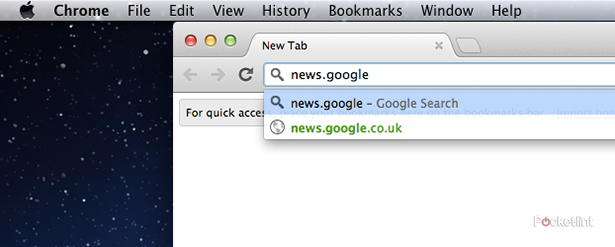Do we still care about .com and .co.uk? Does anyone even bother with www.? Well thanks to ICANN, a body in charge of licensing new top-level domain names, the way we search for a website might be about to change.
Most people who type Google into an address bar are going to be looking for one thing: Google. So why overcomplicate matters with jargon at the beginning and the end when the formatting is now a thing of legacy? Google Chrome did a lot to change the way people search and browse the web by combining search and URL into one bar. Stick on Google Instant and just typing the word Facebook, for example, will take you straight to that website.
As we speak the web is in danger of becoming an even more complex place. Thanks to ICANN, the internet corporation for assigned domain names and numbers, we may have to change the way we go to a website entirely. ICANN is about to release a set of unique domain names away from the traditional .com or .co.uk. or dot-whatever other country.
The likes of Google.com could now also exist at an address such as search.google, or a person's Twitter page could be pocket-lint.twitter for example. These new addresses are known as generic top-level domains and are currently up for grabs to most of the major internet players.
ICANN's chairman, Peter Thrush, was quoted as saying: “Today's decision will usher in a new internet age. We have provided a platform for the next generation of creativity and inspiration. Unless there is a good reason to restrain it, innovation should be allowed to run free.”
The problem is that this creativity Thrush talks about costs $185,000 and a further $25,000 a year to keep. That limits those who can bid to the more substantial web players. But is it really going to inspire any creativity at all? Speaking to Stephen Ewart, the marketing manager at names.co.uk, one of the UK's biggest domain name registrars, it seems otherwise.
“This is more about brand protection” says Ewart. “Personally I don't think .coms are going to disappear, it's more about what you get in addition to .coms”
The idea is that these new top-level domain names give increased flexibility in how people access your website. Using Google as an example, again, it might make it easier for it to clarify each of its separate services. So that would mean unique addresses like maps.Google or plus.Google.
We wont know exactly how things have changed, if at all, until ICANN starts releasing details. Even then, it's likely that a lot of the major internet players will be simply purchasing the domain names to stop others getting hold of them. After all, we can't imagine Facebook.com or Google.com being anything other than what they already are, their domain names being utterly fundamental to their web identity.
“What we might see is people searching for things like '.Wales .London or .Scot'” says Ewart, adding “We expect a little more specialisation around different extensions.”
One idea is that the top level domain names will have more impact at a local level. Having forums or websites ending with .Sanfrancisco or .skate, for example, could indicate to those searching for them exactly where and what they're about.
“In Ireland, they want to know a lot about people who are taking an .ie domain name," says Ewart
"It's actually quite hard to get an .ie domain name, contrasted with .com where it's actually very easy to get and there are no restrictions.”
So, at a country code level, specialisation of domain names could mean a filtering to make sure that the sites associated with a certain suffix really are relevant to that nation.
In the end, though, the concept of changing domain names still seems backward. In fact, bothering the user with an ending protocol of any sort is starting to feel pointless.
There is already a Chrome-style search bar implemented into Safari with Mountain Lion. Similarly, things like the Xbox, with its Kinect controlled Bing search, make getting to a website a much more fluid experience and the web would probably be a better place for the user with domains only the concern of the goings on behind your browser's GUI.
The other side of the argument is that the generic domains might increase the relevance of your surfing experience. Take eBay, for example. Navigating to eBay.shop and then having it redirect to your local version of the site using your IP address would be better than going to eBay.co.uk or .co.jp.
“You could have shop.google or apps.google. The point is it gives them much more flexibility,” says Ewart.
“One of the things they might do is that they might choose to give away a load of free domain space to customers.”
And that brings us to what can be seen as the logical, and perhaps best, use of all these domain names - creating a personalised web space on social networks. Pocket-lint's Facebook page, for instance, could become pocket-lint.facebook and so a much easier page to navigate to.
In the end we can't know until ICANN releases details, but it is entirely possible some of the most browsed websites out there might be accessible in more ways than one. In the end, though, perhaps the fact that the dot anything revolution barely appears as headline news is what really speaks volumes here. But, if you can't find Pocket-lint some time in the future, gadgets.pocket-lint is probably worth a try.
Like the idea of custom top level domain names? Let us know in the comments below ...

